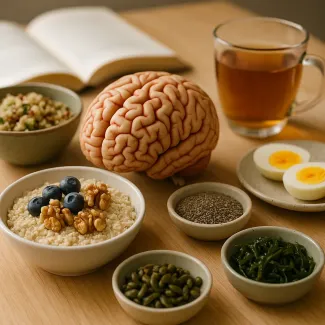
Recharge Your Brainpower Naturally in Your Thirties
Smart strategies to sharpen your focus and sustain your mental vitality every day
Understanding the energy behind your mind: what is mental energy?
Mental energy is more than just the absence of fatigue. It reflects your capacity for concentration, your emotional stability, and your ability to make clear decisions. Unlike physical energy, which can be easily measured through exertion or muscle fatigue, mental energy is more subtle—but equally vital. In your 30s, when responsibilities accumulate and life's pace accelerates, your brain often becomes the primary organ under pressure.
This decade often introduces new challenges: managing a career, relationships, possibly parenting, and making long-term decisions. All these rely heavily on cognitive flexibility, emotional balance, and alertness. That’s why focusing on boosting your mental performance becomes not a luxury, but a lifeline for sustainable productivity and personal fulfillment.
Many people in their thirties report that they’re tired but can’t rest, wired but can’t concentrate. This contradiction often stems from depleted neurotransmitter function, poor lifestyle patterns, and overstimulation from screens, multitasking, and chronic stress.
The biological roots of mental fatigue after 30
In your 30s, your brain’s natural energy regulators start shifting. While you're still far from cognitive decline, subtle hormonal and neurological changes start appearing. Cortisol, the stress hormone, may become more erratic due to external stressors. This interferes with serotonin and dopamine regulation, both of which are crucial for motivation and clarity.
At the same time, blood sugar stability, mitochondrial efficiency, and inflammatory responses begin playing a greater role in how much mental endurance you can maintain. Even slight dips in B-vitamin availability, iron absorption, or thyroid activity can produce noticeable effects on concentration and drive.
You may find yourself forgetting things more often, losing your train of thought, or struggling to switch between tasks. This is not just aging—it’s an invitation to fine-tune your inner systems to support the next decades of brain performance.
Everyday habits that fuel mental clarity in your 30s
Building a resilient and energized mind is about daily behaviors, not overnight transformations. Mental energy is deeply connected to lifestyle rhythms—especially sleep, food, movement, and emotional regulation.
Start with quality sleep—your brain's recovery system
If there's one keystone habit to prioritize, it's restorative sleep. Your brain flushes out metabolic waste through the glymphatic system, especially during deep sleep stages. This system becomes less efficient when you skimp on rest, leading to the build-up of toxins that contribute to brain fog, mood swings, and sluggish thinking.
Create a wind-down routine at night that avoids blue light, lowers stimulation, and signals safety. A consistent bedtime, ideally before 11:00 PM, is not old-fashioned—it’s neuroscience-backed restoration.
Fuel your neurons with brain-optimized nutrition
The brain consumes about 20% of the body’s total energy, primarily in the form of glucose. But it doesn’t thrive on just any sugar—it needs stable, slow-releasing nutrients combined with neuroprotective compounds.
In your 30s, focus on:
- Omega-3 fatty acids (from wild-caught fish, chia seeds, flaxseeds) to support synaptic fluidity
- Complex carbohydrates (like quinoa, lentils, buckwheat) to ensure even energy release
- Choline-rich foods (eggs, liver, soy lecithin) to enhance memory and neurotransmitter synthesis
- Magnesium and zinc to balance neurotransmission and stress reactivity
Avoid ultra-processed foods high in trans fats and additives—they hijack your gut-brain axis, which is essential for producing serotonin and dopamine.
Move smarter, not harder, to activate mental endurance
Exercise isn't just about muscles or weight control. It’s a brain enhancer. Physical activity boosts BDNF (brain-derived neurotrophic factor), which promotes neuron growth and survival. But you don’t need to overtrain.
In your 30s, the best results come from moderate, consistent movement:
- Brisk walking for 30–45 minutes
- Short HIIT workouts 2–3 times a week
- Yoga or mobility flows to calm the nervous system and increase oxygenation
These activate the prefrontal cortex, improving problem-solving and decision-making capacities—both crucial when your days are packed.
Rethink how you use your attention
The modern world is engineered to fragment attention. Every ping, swipe, and alert steals microseconds of your concentration power. These micro-disruptions compound into hours of lost productivity and mental exhaustion.
Learn to batch tasks based on brain states. Creative thinking often peaks in the morning; administrative tasks suit mid-afternoon. Reserve your peak alertness for deep work, and don’t force your brain into performance mode all day.
Digital hygiene matters: silence notifications, close tabs, and take vision breaks every 60–90 minutes. Even a 5-minute outdoor walk or gazing out a window can reset your attentional capacity.
The role of gut health in sustaining mental energy
What happens in your gut echoes in your brain. The enteric nervous system in your digestive tract produces nearly 95% of your serotonin. A disrupted microbiome leads to inflammation, which impairs neural signaling and mood regulation.
Feed your gut with:
- Fermented foods (sauerkraut, kefir, kimchi)
- Diverse plant fibers (over 30 types of vegetables, fruits, seeds per week)
- Polyphenol-rich foods (berries, olives, green tea)
Reduce exposure to antibiotics, alcohol, and processed sugar, which damage the gut lining and microbiota diversity. A healthy microbiome directly fuels your mental stamina and emotional balance.
Emotional boundaries and mental bandwidth
Many people in their thirties fall into the trap of overcommitment—social, professional, digital. Each "yes" drains a small percentage of your mental bandwidth. Learning to say “no” without guilt is a powerful strategy for reclaiming focus and mental space.
Reevaluate your calendar. Notice which meetings, relationships, or routines leave you mentally energized versus mentally depleted. Protect your peak focus hours like you would any critical resource.
Mental decluttering is just as important as physical decluttering. Unsubscribe from unnecessary inputs. Let go of perfectionism. Make space for intentional thought.
Natural supplements that support mental clarity in your 30s
When diet and lifestyle are in place, certain targeted supplements can enhance your mental energy—especially during demanding life phases.
Consider:
- Rhodiola rosea: an adaptogen known to reduce fatigue and increase alertness under stress
- L-theanine: promotes calm focus, especially when combined with low-dose caffeine
- Lion’s Mane mushroom: supports neurogenesis and long-term memory formation
- Acetyl-L-carnitine: enhances mitochondrial energy production in brain cells
Always cycle supplements and monitor how your body responds. Supplements should amplify, not replace, a balanced lifestyle.
Rewiring your inner narrative: the power of self-talk
Your internal dialogue affects your cognitive stamina. If your thoughts are critical, rushed, or fear-driven, your brain stays in a low-level stress state. Over time, this erodes mental clarity.
In your 30s, it’s time to shift from achievement-based identity to value-based self-respect. Affirmations, journaling, or coaching can help you reframe your mental scripts. Practicing self-compassion, especially in failure, frees up mental resources otherwise spent on rumination and self-doubt.
Breathing for mental energy: using your diaphragm
You can’t think clearly when your breathing is shallow. Oxygen fuels cognition, and many adults in their 30s develop dysfunctional breathing patterns due to stress and poor posture.
Re-train your breath with:
- Box breathing (inhale 4s, hold 4s, exhale 4s, hold 4s)
- Nasal breathing during work and light exercise
- Diaphragmatic awareness (belly rising, not chest)
Conscious breathing techniques reduce cortisol, increase oxygenation, and restore parasympathetic balance, the state where deep thinking and restoration happen best.
Creating your mental energy ritual
Instead of chasing motivation, build rituals that trigger focus. Rituals eliminate decision fatigue. In your 30s, it's especially important to create repeatable structures that align with your biology.
Examples:
- Morning light exposure + hydration + movement
- Mid-morning no-distraction work sprint
- Afternoon walk without your phone
- Evening technology shut-down and light dinner
- Weekend nature exposure and social rest
Over time, these rituals become anchors for clarity and purpose, building a foundation for not just a productive life, but an aligned and meaningful one.
Protecting your cognitive future starts now
Your 30s are the ideal decade to invest in your mental infrastructure. What you do now sets the tone for your brain’s performance in your 40s, 50s, and beyond.
Most importantly, treat your mind like you would treat an elite athlete’s body: with respect, consistency, recovery, and training. The more mental energy you can sustainably generate, the more confidently you’ll navigate the ever-expanding demands of modern life.
Not with hustle—but with focused, clear, and vibrant presence.





